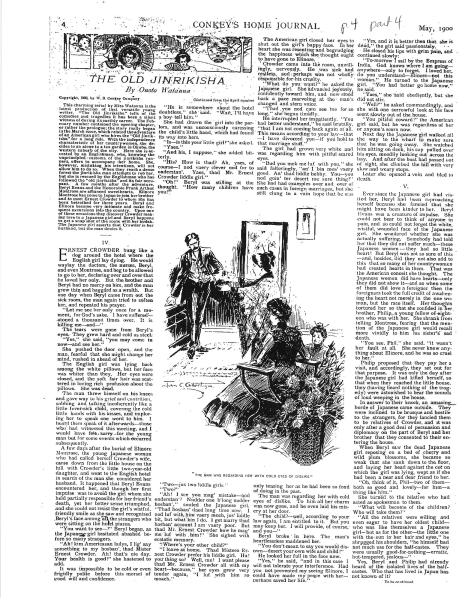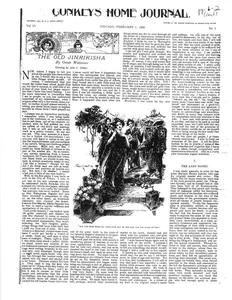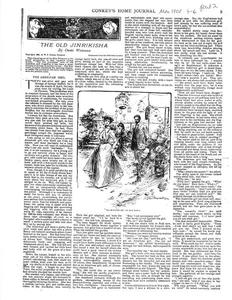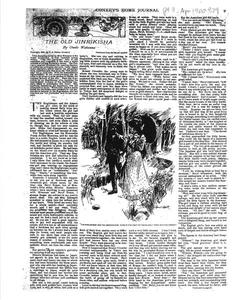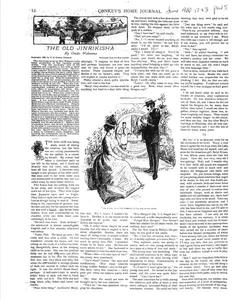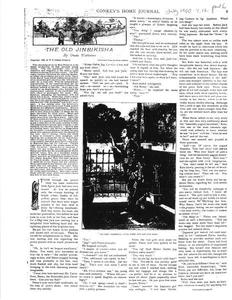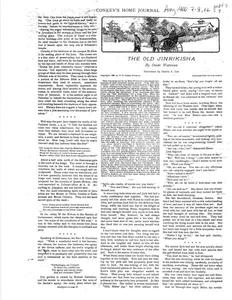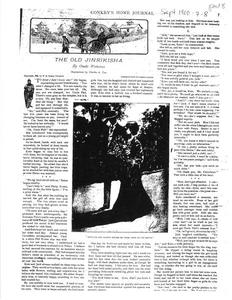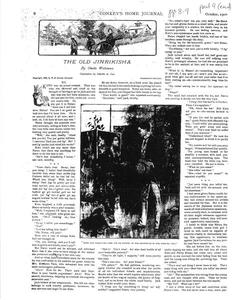IV.
Ernest Crowder hung like a dog around the hotel where the English girl lay dying. He would waylay the doctors, the nurses, Beryl, and even Montrose, and beg to be allowed to go to her, declaring over and over that he loved her only. But the brother and Beryl had no mercy on him, and the man grew thin and haggard as a wraith. But one day when Beryl came from out the sick room, the man again tried to soften her, and repeated his prayer.
“Let me see her only once for a moment, for God’s sake. I have suffered—-atoned a thousand times over. It is killing me—-and—-”
The tears were gone from Beryl’s eyes. They grew hard and cold as steel.
“Yes,” she said, “you may come in now—-and see her.”
She pushed the door open, and the man, fearful that she might change her mind, rushed in ahead of her.
The English girl was lying back among the white pillows, but her face was whiter than they. Her eyes were closed, and the soft fair hair was scattered in loving rich profusion about the pillows. She was dead.
The man threw himself on his knees and gave way to his grief and contrition, sobbing and talking incoherently like a little, fever-sick child, covering the cold little hands with his kisses, and imploring her to speak one word to him. I heard them speak of it afterwards—-those who had witnessed this meeting—-and I would have felt sorry for the young man but for some events which occurred subsequently.
A few days after the burial of Elinore Montrose, the young Japanese woman who had called herself Crowder’s wife, came down from the little house on the hill with Crowder’s little two-year-old daughter, and went to the English hotel in search of the man she considered her husband. It happened that Beryl Evans encountered her, and though her first impulse was to avoid the girl whom she held partially responsible for her friend’s death, yet her better sense triumphed, and she could not resist the girl’s wistful, friendly smile as she saw and recognized Beryl’s face among all the strangers who were sitting on the hotel piazza.
“You want to see—-?” Beryl began, as the Japanese girl hesitated, abashed before so many strangers.
“Ah! kin’ Americazan ladys, I lig’ say something to my hosban’, thad Mister Ernest Crowder. Ah! that’s nize day. Your health is good?” she hastened to add.
It was impossible to be cold or even frigidly polite before this morsel of good will and confidence.
“He is somewhere about the hotel, doubtless,” she said. “Wait, I’ll have a boy tell him.”
She had drawn the girl into the parlors, and was unconsciously caressing the child’s little hand, which had found the way into hers.
“Is—-is this your little girl?” she asked.
“Yaes.”
“And his, I suppose,” she added bitterly.
“His? How is thad? Ah, yaes, of course—-I nod vaery clever nod for to onderstan’. Yaes, thad Mr. Ernest Crowder liddle girl.”
“Oh!” Beryl was stifling at the thought. “How many children have you?”
“Two—-jus two liddle girls.”
“Two?”
“Ah! I see you mag’ mistake—-nod onderstan’? Nudder one b’long nudder hosban’,” smiled the Japanese girl. “Thad hosban’ daed long time ago. I nod luf with him vaery much, jus’ liddle bit, but what kin I do. I got marry thad hosban’ account I am vaery poor. But thad Mr. Ernest Crowder how he mag’ me luf with him!” She sighed with ecstatic memory.
“Where’s your other child?”
“I leave at home. Thad Mistero Ernest Crowder prefer his liddle girl. Ha! you thing so? Well, me? I want please thad Mr. Ernest Crowder all with my heart—-because,” her eyes grew very tender again, “I luf with him so moach.”
The American girl closed her eyes to shut out the girl’s happy face. In her heart she was resenting and begrudging the happiness which she thought ought to have gone to Elinore.
Crowder came into the room, unwillingly, nervously. He was sick and restless, and perhaps was not wholly responsible for his cruelty.
“What do you want?” he asked the Japanese girl. She advanced joyously, confidently toward him, and now stood back a pace, marveling at the man’s changed and stern voice.
“Thad you nod cum see me for so long,” she began timidly.
He interrupted her impatiently. “You had better understand,” he said brutally, “that I am not coming back again at all. This means, according to your law—-that—-I have divorced you—-if you hold to that marriage stuff.”
The girl had grown very white and was regarding him with pitiful, scared eyes.
“Bud you mek me luf with you,” she said falteringly, “an’ I bin mos’ vaery good. An’ thad liddle bebby. You—-you nod goin’ ter desert me sure thing?” She had had examples over and over of such cases in foreign marriages, but she still clung to a vain hope that he was only teasing her, as he had been so fond of doing in the past.
The man was regarding her with cold eyes of dislike. To him all her charm was now gone, and he even laid his misery at the door.
“The child?—-well, according to your law, again, I am entitled to it. But you may keep her. I will provide, of course, and you—-”
Beryl broke in here. The man’s heartlessness maddened her.
“You don’t mean to say you would disown—-desert your own wife and child!”
He looked her full in the face now.
“Yes,” he said, “and in this case I will not tolerate your interference. Had you not prevented my seeing Elinore, I could have made my peace with her—-perhaps saved her life.”
“Yes, and it is better then that she is dead,” the girl said passionately.
He closed his lips with grim pain, and continued slowly:
“To-morrow I sail by the Empress of India. God knows where I am going—-anywhere—-only to forget. I loved her, do you understand—-Elinore—-not this woman.” He turned to the Japanese girl. “You had better go home now,” he said.
“Yaes,” she said obediently, but she did not stir.
“Well?” he asked commandingly, and she with one sorrowful look at his face went slowly out of the house.
“You pitiful coward!” the American girl said, but he was regardless of her or anyone’s scorn now.
Next day the Japanese girl walked all the way to the wharf to make sure that he was going away. She watched him sitting on deck, his cap pulled over his eyes, moodily looking out across the bay. And after the boat had passed out of sight, she climbed the hill with very slow and weary steps.
Later she opened a vein and bled to death.
V.
Ever since the Japanese girl had visited her, Beryl had been reproaching herself because she fancied that she might have been kinder to her. Beryl Evans was a creature of impulse. She could not bear to think of anyone in pain, and so could not forget the white, wistful, wounded face of the Japanese girl. She wondered whether she was actually suffering. Somebody had told her that they did not suffer much—-these Japanese women—-they had so little heart! But Beryl was not so sure of this—-and, besides, did they not also add to this that so many of her countrywomen had created hearts in them. That was the American conceit, she thought. The Japanese women did have hearts—-only they did not show it—-and so when some of them did love a foreigner then the foreigners took the full credit of awakening the heart, not merely in the one woman, but the race itself. Her thoughts tortured her so that she confided in her brother, Philip, a young fellow of eighteen who was with her. She shrank from telling Montrose, fearing that the mention of the Japanese girl would recall more vividly to him his sister’s sad death.
“You see, Phil,” she said, “it wasn’t her fault at all. She never knew anything about Elinore, and he was so cruel to her.”
Philip proposed that they pay her a visit, and accordingly, they set out for that purpose. It was only the day after the Japanese girl had killed herself, so that when they reached the little house, they (having heard nothing of the tragedy) were astonished to hear the sounds of loud weeping in the house.
In answer to their knock, an amazing horde of Japanese came outside. They were inclined to be brusque and hostile to the strangers, for they fancied them to be relatives of Crowder, and it was only after a good deal of persuasion and diplomacy on the part of Beryl and her brother that they consented to their entering the house.
When Beryl saw the dead Japanese girl reposing on a bed of cherry and wild plum blossoms, she became so weak that she sank down to the floor, and laying her head against the cot on which the girl was lying, wept as if she had been a near and dear friend to her.
“Oh, think of it, Phil—-two of them—-both so good and lovely—-for him—-a thing like him.”
She turned to the relative who had acted as spokesman to them.
“What will become of the children? Who will take them?”
“All the relatives were willing and even eager to have her oldest child—-who was, like themselves, a Japanese girl--but as for the other—-the little one with the sun in her hair and eyes,” he shrugged his shoulders, “he himself had not much use for the half-castes. They were usually good-for-nothing—-erratic, hot-tempered, jealous—”
Yes, Beryl and Philip had already heard of the isolated lives of the half-castes. Who that has lived in Japan has not known of it?
